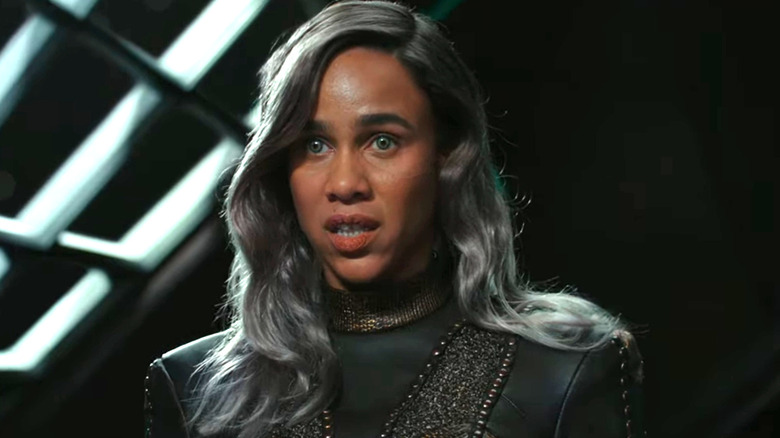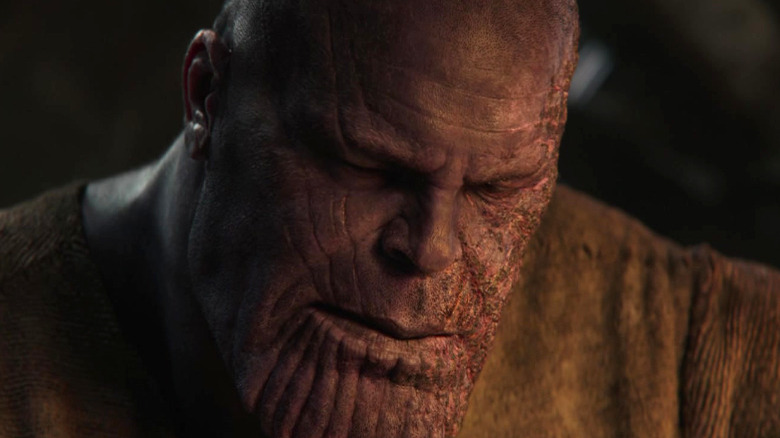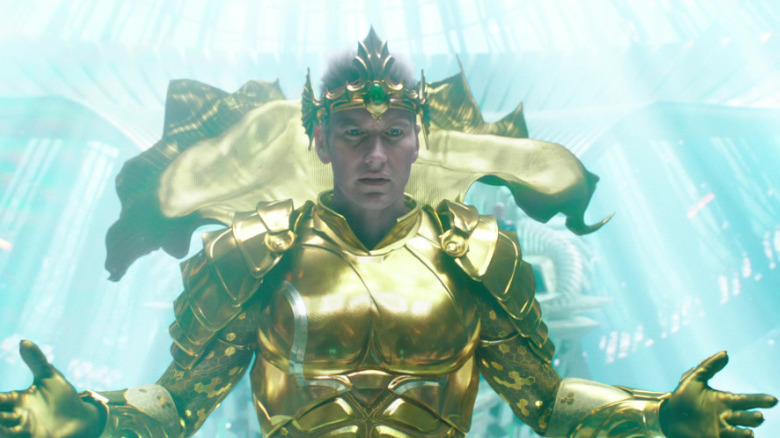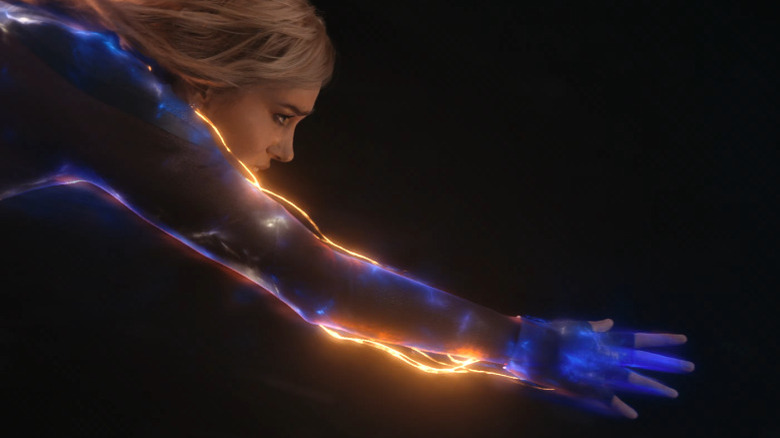There's One Thing The Marvels Does Better Than Avengers: Endgame
This post contains spoilers for "The Marvels."
In "The Marvels," Captain Marvel, Ms. Marvel, and Monica Rambeau (the latter of whom, we will, in accordance with Kamala Khan, henceforth call "Professor Marvel") do battle with Dar-Benn, a Kree warrior who plans to destroy multiple worlds. It's not a nice thing to do, and it makes sense that our heroes don't want her to do it.
There's just one problem.
Dar-Benn, played by Zawe Ashton, isn't just wrecking planets for fun. We learn quickly that she's using the power of the Quantum Bands — never mind those, they're just a MacGuffin — to remove the atmosphere, the oceans, and even the sun from other inhabited worlds and move them to her own world, Hala, which was left in ruins after Captain Marvel, at the end of her first movie, liberated it from the Supreme Intelligence.
It turns out that destroying an entire planet's infrastructure without even thinking for one second about how to build it back up again was pretty short-sighted. Who knew? So although Dar-Benn isn't being very nice about it, she is attempting to solve a very real problem. Her whole planet is dying, and so are her people.
Dar-Benn is the latest in an increasingly long line of blockbuster movie villains who plan to do terrible things for a seemingly noble cause. But "The Marvels" does something that other movies about anti-villains — even the ultra-popular and monumentally successful "Avengers: Endgame" — didn't do.
"The Marvels" does it right.
Thanos was wrong (but so were The Avengers)
Like Dar-Benn, Thanos didn't commit his acts of villainy without motivation. Thanos believed that overpopulation was an existential threat to the entire universe, so he assembled the all-powerful Infinity Gauntlet in order to kill half the living beings in existence, and by extension, save the other half.
Now, there are gigantic problems with Thanos's plan. For one thing, if the Infinity Gauntlet really did have the power to do literally anything, he could have used it to make increase the number of resources. He could even have used it to make the universe large enough to accommodate everybody in it. He wasn't a noble being doing something terrible because it was the right thing to do. If you see a problem and the only way you can imagine solving it involves mass murder, then there's another problem we all have to deal with, and that problem is you.
But there's another big problem, and that's the fact that even though the Avengers defeated Thanos — and thank goodness they did, he was a big jerk — they didn't actually do anything about the central problem. Heck, they couldn't even think of a way to stop Thanos that didn't involve using the Infinity Gauntlet to commit mass murder, too. They defeated the bad guy but they didn't prove they were better than him, by having a better way to resolve his problem. Overpopulation is the issue the film brings up, and unlike most other problems raised in superhero movies — extraterrestrial invasions, imminent explosions, rampaging monsters — the so-called "heroes" of the Marvel Cinematic Universe do literally nothing to stop it.
The superheroes beat up the bad guy and called it a day, and there's nothing "super" about that kind of heroism.
Why are only the villains activists?
"Avengers: Endgame" isn't the only film with this problem. Thanos isn't the only villain with a legitimate motivation for their villainy. There has actually been a significant and frustrating trend in blockbuster cinema to use real-life existential concerns like climate change as motivations for extreme supervillainy.
In "Fast and Furious Presents: Hobbs and Shaw," Brixton (Idris Elba) plans to use a virus to kill the world in order to, ironically, save it. In "Godzilla: King of the Monsters," Dr. Russell (Vera Farmiga) unleashes giant monsters to cleanse the Earth and give the planet a chance to start over. In "Aquaman," the Atlantean King Orm (Patrick Wilson) wants to wage war against humanity for polluting the planet until it's nearly unlivable.
All of these films give their villains understandable motivations in order to make them more complicated and interesting. But all of these also films end with the villain defeated, in one way or another, and their understandable motivations completely unaddressed. If this happened in only one film, it might not be worth complaining about very much, but taken in aggregate, this blockbuster trend has the annoying and unhelpful impact of minimizing real world concerns and demonizing the only characters in the film who actually care about them.
If only the villains care about climate change, overpopulation, and pollution, and the heroes only care about stopping the villains, that is, at best, not a great look. At worst, these enormously successful motion pictures are collectively equating reasonable concerns about humanity's continued existence with extreme overreactions and grotesque immorality.
When heroes act like heroes
"The Marvels" is one of the few films in this cycle to not only defeat the villain but also acknowledge that their concerns were valid, even if their methodology was wrong. What's more, Captain Marvel actually does something about it.
Throughout the film, Captain Marvel (Brie Larson) is deeply conflicted, and rejects the idea that she's a hero because, at the end of her first movie, she did something she thought was right that had horrible consequences. She couldn't stop Dar-Benn from stealing the atmosphere and the ocean from two other planets, but she is able to stop Dar-Benn from stealing the sun and destroying Earth.
That's great for humanity, but Hala's sun is still dying, and in the final moments of the film, Captain Marvel — uncertain of whether it's possible, and at the risk of destroying herself in the process — flies into the Kree sun and reignites it. It doesn't entirely make up for the damage she's caused, but it's a start, and it shows a superhero doing something not just heroic, but superheroic. She doesn't just beat up the bad guy, she solves the bad guy's problem and saves countless lives.
"The Marvels" isn't the only MCU movie to admit the bad guy had a point and have the hero actually do something about it. That's how "Black Panther" ends (even though we don't see a lot of follow-through afterwards). But it's a heck of a lot more than "Endgame" does. Thanos was defeated, but the heroes, who also have an Infinity Gauntlet and other seemingly endless resources, don't do anything to stop climate change or replenish the planet's (or the galaxy's) dwindling natural resources.
"Avengers: Endgame" was about beating the bad guy. "The Marvels" is about proving our heroes are better people, too. And on that level, it's a more satisfying tale of genuine super-heroism.



